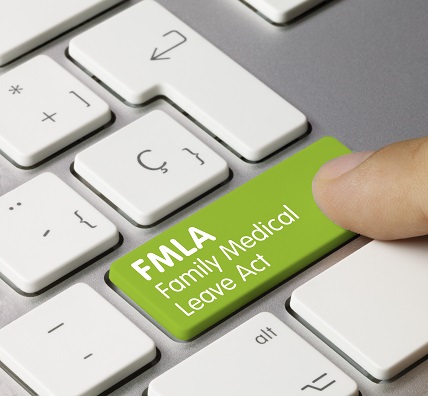Under Federal law, the Family and Medical Leave Act (otherwise known as FMLA) allows certain eligible employees of covered employers to take unpaid, job-protected leave for specified family and medical reasons with continuation of group health insurance coverage under the same terms and conditions as if the employee had not taken leave.

When is an Employee Covered By FMLA?
Certain employees that are covered under FLMA are entitled to 12-workweeks of FMLA leave in a 12-month period for any of the following reasons:
Birth of a child and to bond with the newborn child within one year of birth
Both mothers and fathers, as eligible FMLA employees, are entitled to FMLA leave for birth and bonding with their baby. This right expires 12 months after the date of birth and it must be taken as a continuous block of leave unless the employer agrees to allow intermittent leave, such as allowing a parent to return to work on a part-time schedule for 10 weeks.
Placement with the employee of a child for adoption or foster care and to bond with the newly placed child within one year of placement
FMLA leave is also available for parents of adopted children or foster parents. As such, if an absence from work is required for the placement for adoption or foster care, qualifying parents may take time off before the placement or adoption of a baby or child.

Moreover, FMLA leave is still available to bond with a child after placement and this time must be taken as a continuous block of leave, that is, unless the employer agrees to allow another arrangement. It is also important to note that under FMLA leave for the adoption or foster care, the employee’s entitlement to such leave expires 12 months after the placement.
Serious health condition that makes the employee unable to perform the functions of his or her job
Under this type of FMLA leave, the employee is “unable to perform the functions of the position” when his or her health care provider finds that the employee (a) is unable to work at all, or (b) is unable to perform any one of the essential functions of the employee’s current position.
To care for the employee’s family member who has a serious health condition
Under this type of FMLA leave, the employee needs leave to provide care for his or her spouse, son, daughter, or parent because of the family member with a serious health condition. For instance, the employee may need this leave to provide care to the family member because
(i) the family member with a serious health condition is unable to care for his or her own medical, other needs, or needs help in being transported to the doctor; or
(ii) the family member with a serious health condition needs psychological comfort and reassurance.
Qualifying family members include:
- Spouse: meaning a husband or wife.
- Parent: the term parent includes a biological, adoptive, step or fosters father or mother. It also includes any other individual who stood “in loco parentis” to the employee when the employee was a child. However, under FMLA, the term does not include “parents-in-law.”
- Son or Daughter: Under FMLA, “son or daughter” includes a biological, adopted, or foster child, a stepchild, a legal ward, or a child of a person standing “in loco parentis.” It also includes individuals that are either under age 18 or age 18 or older and “incapable of self-care because of mental or physical disability” at the time that FMLA leave is necessary.
- In Loco Parentis: The FMLA regulations define “parent” and “son or daughter” to include “in loco parentis,” which includes those with day-to-day responsibilities to care for or financially support a child. Thus, even employees who have no biological or legal relationship with a child/parent may, nonetheless, qualify as in loco parentis to the child/parent and be entitled to FMLA leave.
Other requirements under federal FMLA regulations include:
- The employee be employed with the company for at least 12 months;
- Over the past 12 months prior to the start of FMLA leave, the employee worked at least 1,250 hours for the employer;
- The employer is a covered employer, that employs 50 or more employees within a 75-mile radius of the employee’s specific worksite.
Moreover, for FMLA purposes. it is important to note that home offices are not necessarily considered a work location. Employees that work remotely must consider the physical office location that the remote employees report to and receive their work from as the work location for FMLA purposes.

FMLA Applies to Military Members On Covered Active Duty
Federal FMLA leave also includes any “qualifying exigency” arising out of the fact that the employee’s spouse, son, daughter, or parent is a military member on covered active duty. Eligible employees that fall under this military member exception may take up to 26 workweeks of FMLA leave in a single 12-month period. Under FMLA, such “qualifying exigencies” are situations arising from the military deployment of an employee’s relative to a foreign country and may include the following:- making financial or legal measures to address a covered military member’s absence;
- attendance in certain military ceremonies and briefings;
- taking leave to spend time with a military member on Rest and Recuperation leave during deployment;
- making alternate childcare arrangements for a child of the military member when the deployment of the military member necessitates a change in the existing childcare arrangement; or
- certain activities related to care of the parent of the military member while the military member is on covered active duty.
It is important to note that unlike other sections of FMLA leave, an employee may take qualifying exigency leave for the military deployment of a son or daughter of any age. Moreover, eligible family members of both current service or military members and certain veterans are entitled to military caregiver leave.
FMLA Protections When Coming Back to Work After FMLA Leave
FMLA does more than provide for time off. When an employee returns from FMLA leave, the employer must restore the employee to the same job or to an “equivalent job” he or she had before he or she went on FMLA leave.

Additionally, an employer must restore to the employee all employee benefits an individual had accrued prior to any FMLA leave when that employee returns from FMLA leave, and employers cannot be required to requalify the employee. Moreover, an employee is entitled to any unconditional pay increases—including cost of living increases, unconditional bonuses, and unconditional payments. — that occurred while the employee was on FMLA leave.
Enforcing FLMA in Florida
If you believe that your rights under the FMLA have been violated, you should contact an employment lawyer to learn more about your rights. Our Miami attorneys have years of experience litigating claims of retaliation and FMLA rights. Working together with our New York City, New Jersey, and Philadelphia employment and discrimination attorneys, we have recovered millions on behalf of our clients because of their protected status under federal and state law. If you feel you have been discriminated against, please give our attorneys a call, at 1-305-946-1884, for your free consultation.
Different Types of Workplace Discrimination Cases We Handle:
- Race
- Color
- National Origin
- Religion
- Age (over 40)
- Disability
- Pregnancy
- Gender/Sex
- Sexual Orientation
- Genetic Information
- Equal Pay/Compensation
- Ethnic
- LGBT
- Hair
- Citizenship
- Military Status
